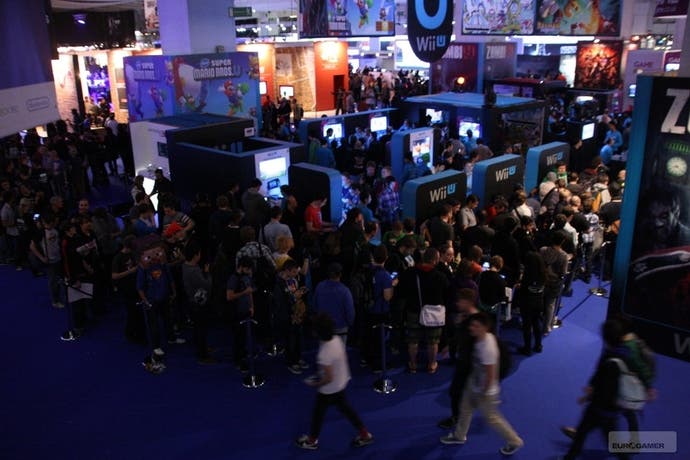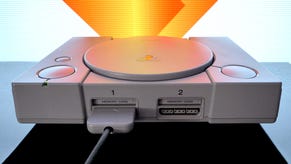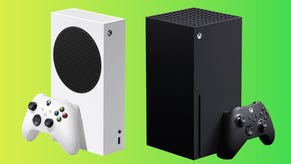Letter from America
It's weeks like this when Jaz misses old Blighty.
For me, the biggest thing happening in gaming this week was actually over on your side of the pond - the Eurogamer Expo. I love this kind of event: it's where gamers can get together, see and play new stuff, and (hopefully) have a great time. Unfortunately, I couldn't make it this year - but I really wish I could have been there. In the US, we have the PAX shows, but there's something special about London-based events. That might sound rather strange, but I've been to many shows in many different countries, and the most memorable ones for me have all been in London. It's a great place, and the crowds are always really positive and enthusiastic. I particularly remember some of the expos of the late 80s and early 90s, which were just brilliant. I'm glad EGX has picked up from where they left off and brought them bang up to date.
Of course, I did go to E3 this year, but while it's an incredible showcase for the industry, it's also just that: an industry showcase. Yes, I love seeing all the new games, but it's work. I'm there to report on what's going on and to do business, and generally speaking, if you're doing it right, there's very little time to have fun. Sure, I always carve out a bit of time at the end of the show to go back and spend time with the games I'm personally most interested in, but for the most part, E3 is a heaving, sweaty, hyper-competitive, sleepless, wall-to-wall meeting, blur.
E3 is also trade only. Expos like EGX and PAX are for the public, and I believe these are exactly what gaming needs. In the early days of gaming, arcades made things very social, and (maybe it's just me) there seemed to be a lot of local micro fairs and general “computer club” type activities where people would get together. During the 90s, gaming became more of a focused group activity through events like LAN parties, and as we rolled into this century, online really began to kick in and players were able to connect remotely. Gaming suddenly became massively social again - but not in the physical sense. But while being able to connect with people online is a great thing, there's still nothing quite like getting together with people in a physical space to really precipitate meaningful conversation and exchanges of ideas. For the most part, I find if I'm socially gaming online, the activity is the focus. When I engage in physical social gaming, the experience if far richer, because the conversations are more interesting and the competitive aspect of gaming is far more visceral and fun.
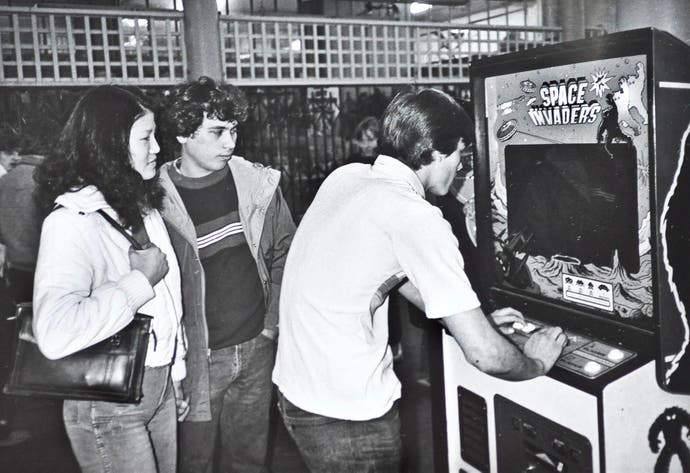
What I'd love to see - and this is just a topic for conversation, but I'm interested to see what people think - is something that might help open up gaming to become a more social activity again. I believe that retail is undergoing a huge change, and at some point towards the end of this decade, we'll see a large shift towards “showrooming” of consumer products with direct delivery ordering, rather than the typical store-based distribution model that we see today. Some retailers will close - which will be sad, but times change - and space will open up for different kinds of business models and consumer destinations. One of which could be the equivalent of a new type of arcade.
One of the technologies I've been looking at very closely recently is browser-based gaming and streaming tech. Very soon - and I've already played with this sort of demo - you'll be able to turn on a web-enabled TV, connect to a game that streams down a pipe, and use your phone to control it. No lag. No wires. And also, not crap. This is a browser delivering console-type gaming down a wire, on demand. No loading or carrying around gear, except maybe a Bluetooth controller that you connect to your phone if you want to play with a “real” joypad. The tech is still some years away, but like I said, I've already been playing around with early demos, and you can see exactly where it's going - and a reason why hardware companies are investing so much money creating robust services that supply games. They're hedging their bets against what some are already speculating - that this next generation of consoles might be the last, at least in terms of what we currently think of as consoles.
This streaming/wireless tech basically enables clusters of people to connect instantly to a game, either playing around single screens where they might all be multiplayer gaming - or playing on individual screens for games that might require them. Either way, it's all wireless, it's very low-cost (screens are cheap these days) and it creates a social space for competition and teamwork. Which means it's an ideal venue for eSports, whether you're participating yourself, or cheering on your local heroes in local matches, or perhaps even on national and international levels.
In a way, I'm talking about a bizarre mash-up of a bunch of things: a pub, a karaoke bar, an arcade... and even a bit of bingo hall. Essentially, a modern take on a social centre based around something that we know people love to do together - and that's gaming. Maybe the idea is a non-starter, but I believe the concept of social gaming centres is something that's at least worth thinking about. It'd be a shame if we had all this tech available to us, and the best thing we could do with it was turn ourselves into shut-ins.
Speaking of future tech, the SteamOS announcement was interesting this week, if feeling somewhat premature. I'm keen to hear more about what these machines actually are, as I've head some pretty broad interpretations, from “it's a console that's like Wii U but without the screen” to “it's a Roku streaming box for games.” I'm sure we'll find out soon enough.
Earlier this week I trundled down to Silicon Valley to visit EA and play with two new Sims products - a time-travelling expansion to the current Sims game, and the completely new, next-generation one. I'm not much of a Sims fan to be honest, but I did walk away from Sims 4 thoroughly impressed and thinking that maybe this time around I'll try to squeeze it into my packed gaming schedule.
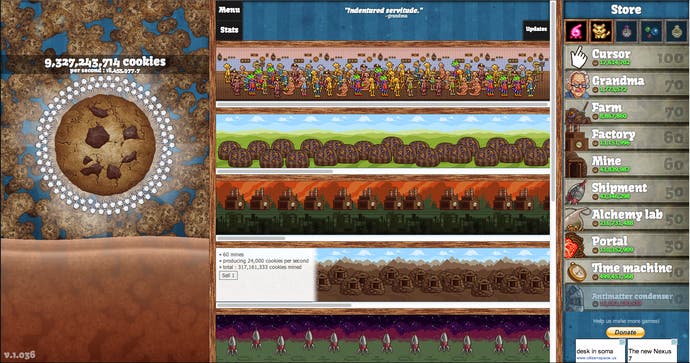
I also discovered the delights of Cookie Clicker, which is just about the most pointless and stupid thing ever. It's a numbers-based browser game that, like many pointless and stupid things, is surprisingly fun and addictive too. Well, at least for people who love high scores and big, big numbers. Take a look and see what you think.
Our man Jeremy did a feature-length preview on Metal Gear Solid 5, which is essential reading for fans of the game, and he also reviewed Etrian Odyssey, a modern take on old-school RPG games that was released on 3DS this week. I played it a few weeks ago, and enjoyed it. But damn is it hard.
Mike questioned whether Xbox One is ready for launch, and feels that perhaps Microsoft is rushing its machine out in time for the Christmas period. He went through the reasons why he feels that way, and makes a convincing case.
While I will inevitably end up with both consoles, I'm more interested in the PlayStation 4, as that has the most impressive mid-term software lineup. Don't get me wrong - Xbox One also has some great games. But damn, there's some sweet stuff in Sony's lineup. I'll talk more about those soon.
Jaz Rignall is editorial director of USgamer.net, which is the American version of the site you're currently reading right now.
